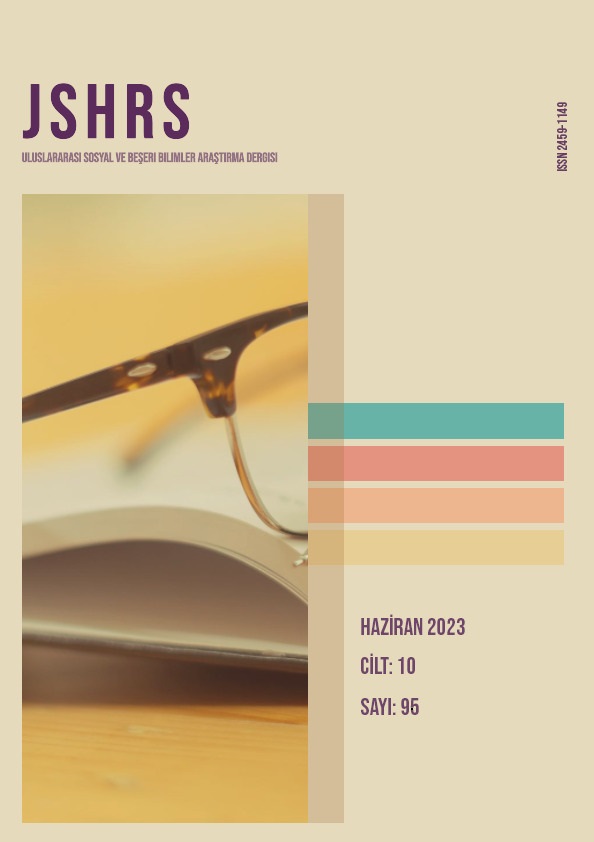Effective Teacher Behaviors in the Light of Educational and Cultural Concepts
DOI:
https://doi.org/10.5281/zenodo.8112146Keywords:
Education, Teaching, Culture, Teacher, Effective TeacherAbstract
In this study; By making definitions of the concepts of education, training, and culture, it has been stated what effective teacher behaviors are. The effects of the defined concepts on effective teachers, ideal teachers, and good teacher behaviors are mentioned. Who is the effective teacher in this study? How to be an effective teacher? What are the behaviors that show effective teacher behaviors? Answers to your questions are sought. Teachers are people who play an important role in the educational process and devote their lives to transmitting knowledge to future generations. Teachers are necessary in order to develop and progress both individually and socially and to protect the continuity of the next generation. The most fundamental problem of education systems is the quality of education. Evaluations of the quality of education are also increasingly being taken as key measures of what students learn and how well they learn. Therefore, teachers should be lifelong learners who are committed to the academic development of their students. They often have to continue their own education to further develop their methods and skills, and they will be able to carry out this process with how much they have internalized the concepts of education, training, and culture. In short, how educated and open a trainer or teacher is; how much he is committed to learning principles and has command of teaching methods; The more cultured and intellectual it is, the more effective it is. It is these elements that make a teacher effective.
References
Alpar, M. (2013). Yabancı Dil Öğretiminde Kültürel Unsurların Önemi. The Journal of Language and Lengüistik Studie, 9(1), 95-106.
Akalın, S. (2005). Öğretmen Adaylarının Okullardaki Öğretmenlik Uygulamaları Sırasında Geleneksel Öğretmenlik Uygulamasıyla Mikro Öğretim Uygulamasının Karşılaştırılması. Eğitim Araştırmaları Dergisi, 20, 1-13.
Aşılıoğlu, B. (2014). Eğitim ile ilgili Temel Kavramlar. Öğretim İlke ve Yöntemleri içinde (Ed. M. Arslan) (ss. 1-29). Anı Yayıncılık.
Aydın, S. ve Erdal, Y. S. (2014). Antropoloji, (Ed: Handan Üstündağ). Anadolu Üniversitesi Yayınları.
Ay, Ş ve Yurdabakan, İ.(2015).Öğretmen Adaylarına Göre Etkili Öğretmen Özellikleri ve Bu Özellikler Açısından Öz-Yeterlik Algıları. Mehmet Akif Ersoy Üniversitesi Eğitim Fakültesi Dergisi, 33, 148-166
Başaran, İ. E.(1984). Eğitime Giriş. Gal Yayınevi.
Buluş, M., Duru, E., Balkıs, M. & Duru, S. (2011). Öğretmen Adaylarında Öğrenme Stratejilerinin Ve Bireysel Özelliklerin Akademik Başarıyı Yordamadaki Rolü. Eğitim ve Bilim, 36(161),186-198.
Bilhan, S.(1986). Eğitim Sosyolojisi. Ankara, Dil ve Tarih-Coğrafya Fakültesi.
Bostan, H. (2016). Antropoloji, Kültür ve Güvenlik. Güvenlik Bilimleri Dergisi, 5(2), 1-31.
Çapri, B ve Çelikkaleli, Ö. (2008). Öğretmen Adaylarının Öğretmenliğe İlişkin Tutum ve Mesleki Yeterlik İnançlarının Cinsiyet, Program ve Fakültelerine Göre İncelenmesi. İnönü Üniversitesi Eğitim Fakültesi Dergisi,9(15), 101-115.
Çoban, A. (2015). Temel Kavramlar. Öğretim İlke ve Yöntemleri içinde (Ed. G. Ocak). (s. 3-54). Pegem Akademi.
Çorbacı, S ve Bostancı, A. (2013). Okullarda Öğretmenlere Yönelik Performans Yönetimi Uygulamaları ile Öğretmenlerin Örgütsel Bağlılık Düzeyleri Arasındaki İlişki. Uşak Üniversitesi Sosyal Bilimler Dergisi, (Özel sayı), 231-247
Demir, S.(2012).ilköğretim Öğretmenlerinin Etkili Öğretimi Gerçekleştirme Düzeylerinin İncelenmesi. Akademik bakış dergisi, 45-63.
Eagleton, T. (2011). Literary theory: An introduction. John Wiley & Sons.
Erdoğan, İ. ve Korkmaz, A. (2010). Öteki Kuram. Erk Yayınevi
Gümüş, T. (2010). Ortaçağ’dan Erken Modern Döneme Batı Avrupa’da Eğitim Tarihi: Yeni Yaklaşımlar. Mersin Üniversitesi Eğitim Fakültesi Dergisi, 25-40.
Güvenç, B. (2002). Kültürün ABC’si. Yapı Kredi Yayınları.
Hamachek, D. (1969). Characteristics Of Good Teachers And İmplications For Teacher Education. The Phi Delta Kappan, 50(6), 341–345.
Kaya, H ve Böyük, U. (2011). Fen Bilimleri Öğretmenlerinin Labaratuvar Çalışmalarına Yönelik Yeterlilikleri. Erciyes Üniversitesi Fen Bilimleri Enstitüsü Dergisi, (2), 126-134
Okçabol, R. (2008). Secondary education in Turkey. Education in Turkey, 83-105.
Özan, M. B. (2014). Temel Kavramlar. Eğitim Bilimine Giriş içinde (Ed. M. Taşpınar). (s. 42-66). Edge Akademi.
Özbudun, S. ve Uysal, G. (2012). 50 Soruda Antropoloji. Bilim ve Gelecek Kitaplığı.
Passos, A.F.J. (2009). A comparative analysis of teacher competence and its effect on pupil performance in upper primary schools in mozambique and other sacmeq countries. Doctoral thesis, In the Department of Education Management and Policy Studies, Faculty of Education, University of Pretoria
Peker, M. (2009). Genişletilmiş Mikro Öğretim Yaşantıları Hakkında Matematik Öğretmeni Adaylarının Görüşleri. Türk Eğitim Bilimleri Dergisi, 7(2) , 353-376.
Sanders, S. E. (2002). What do schools think makes a good mathematics teacher? Educational Studies, 28(2), 181-191.
Seferoğlu, S. S. (2004). Öğretmen yeterlilikleri ve mesleki gelişim. Bilim ve Aklın Aydınlığında Eğitim, 58(1), 40-45.
Sezgin, O. (2019). Eğitim, Kavram ve Kuram. Kalem Yayıncılık.
Subramaniam, K. (2006). Creating a microteaching evaluation form: The needed evaluation criteria. Education, 126(4), 666-667.
Şimşek, S. (2007). Eğitim İle İlgili Temel Kavramlar. Eğitim Bilimine Giriş içinde. (Ed. N. Saylan). Anı Yayıncılık.
Özkan, R. (2017). Eğitim Bilimine Giriş. Pegem Akademi.
Kaş, B. & Köktürk, Ş. (2021). Akademik Çeviri Programları Kapsamında Eğitim, Öğretim, Eğitim Programı ve Öğretim Programı Kavramlarının Değerlendirilmesi. Toplum ve Kültür Araştırmaları Dergisi, (8), 96-110. https://doi.org/10.48131/jscs.988092
Küçükoğlu, A. (2018). 21. Yüzyılda Eğitim. ed. Özcan Demirel, Zeki Kaya, Eğitime Giriş, 14. baskı, Pegem A. Yay.
Uluç, N. (2023). Antropolojinin Disiplin Olarak Ortaya Çıkışı ve Alt Alanları. (PDF) Erişim:15.04.2023
Ummanel, A. & Dilek, A. (2016). Gelişim ve Öğrenme. Öğretim İlke ve Yöntemleri içinde S. Çelenk). (s. 35-52). Pegem Akademi.
Ünal, S. & Ada, S. (2011). Temel Kavramlar. Eğitim Bilimine Giriş içinde (M. Kağan, & S. Yalçın, ). (s. 1-33). Nobel Akademik Yayıncılık.
Varış, F. (1988). Eğitim Bilimine Giriş. Ankara Eğitim Bilimleri Fak.
Taşpınar, M. (2017). Kuramdan Uygulamaya Öğretim Yöntemleri. Pegem Akademi.
Tezcan, M. ( 1988). Eğitim Sosyolojisine Giriş. Eğitim Fak.
Tük Dil Kurumu [TDK] (t.y.). https://sozluk.gov.tr/ Erişim: 11.04.2023
Westwood, P. (2008). What teachers need to know about Teaching methods. Camberwell, Vic, ACER Press
URL 1 http://blog.ilem.org.tr/hars-ve-medeniyet/ Erişim: 09.04.2023
URL 2 https://tr.wikipedia.org/wiki/K%C3%BClt%C3%BCrel_antropoloji Erişim: 03.04.2023
URL 3 https://sozluk.gov.tr/ Erişim: 02.04.2023
URL 4 https://tr.wikipedia.org/wiki/E%C4%9Fitim Erişim: 05.04.2023
Downloads
Published
How to Cite
Issue
Section
License
Copyright (c) 2023 INTERNATIONAL JOURNAL OF SOCIAL HUMANITIES SCIENCES RESEARCH

This work is licensed under a Creative Commons Attribution 4.0 International License.


